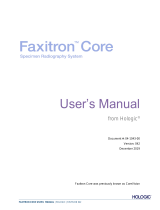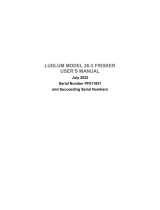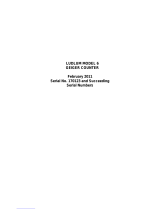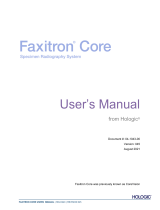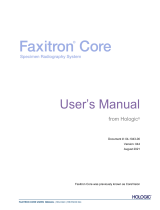Page is loading ...

LUDLUM MODEL 12SA
SURVEY METER
April 2023
Serial Number 349200 and Succeeding
Serial Numbers

LUDLUM MODEL 12SA
SURVEY METER
April 2023
Serial Number 349200 and Succeeding
Serial Numbers

Ludlum Measurements, Inc. April 2023
STATEMENT OF WARRANTY
Ludlum Measurements, Inc. warrants the products covered in this manual to be free of
defects due to workmanship, material, and design for a period of twelve months from
the date of delivery. The calibration of a product is warranted to be within its
specified accuracy limits at the time of shipment. In the event of instrument failure,
notify Ludlum Measurements to determine if repair, recalibration, or replacement is
required.
This warranty excludes the replacement of photomultiplier tubes, G-M and
proportional tubes, and scintillation crystals which are broken due to excessive
physical abuse or used for purposes other than intended.
There are no warranties, express or implied, including without limitation any implied
warranty of merchantability or fitness, which extend beyond the description of the
face there of. If the product does not perform as warranted herein, purchaser’s sole
remedy shall be repair or replacement, at the option of Ludlum Measurements. In no
event will Ludlum Measurements be liable for damages, lost revenue, lost wages, or
any other incidental or consequential damages, arising from the purchase, use, or
inability to use product.
RETURN OF GOODS TO MANUFACTURER
If equipment needs to be returned to Ludlum Measurements, Inc. for repair or calibration, please
send to the address below. All shipments should include documentation containing return shipping
address, customer name, telephone number, description of service requested, and all other necessary
information. Your cooperation will expedite the return of your equipment.
LUDLUM MEASUREMENTS, INC.
ATTN: REPAIR DEPARTMENT
501 OAK STREET
SWEETWATER, TX 79556
800-622-0828 325-235-5494
FAX 325-235-4672


Ludlum Measurements, Inc. April 2023
Table of Contents
Introduction 1
Getting Started 2
Unpacking and Repacking 2-1
Battery Installation 2-1
Battery Test 2-2
Operational Check 2-2
Surveying for Radiation 2-3
Background and Man-made Radiation 2-3
Radiation Limits 2-4
Suggested Survey Technique 2-4
Range Selector and Actual Measurement 2-4
False Alarms 2-5
Specifications 3
Identification of Controls and Functions 4
Safety Considerations 5
Environmental Conditions for Normal Use 5-1
Warning Markings and Symbols 5-1
Cleaning and Maintenance Precautions 5-2
Maintenance 6
Recalibration 6-1
Batteries 6-2
Technical Theory of Operation 7
Input 7-1
Amplifier 7-1
Discriminator 7-1
Scale Ranging 7-1
Digital Analog Converter 7-1
Audio 7-2
Meter Drive 7-2

Model 12SA Survey Meter Technical Manual
Ludlum Measurements, Inc. April 2023
Meter Compensation 7-2
Fast/Slow Time Constant 7-2
Low Voltage Supply 7-2
Low Voltage Reference 7-2
High Voltage Supply 7-3
Alarm 7-3
Recycling 8
Radiation Basics 9
Radiation and Life 9-1
The Unstable Atom 9-2
Radioactive Decay 9-3
Ionizing Radiation 9-4
Measuring Ionizing Radiation 9-5
What are the Health Risks from Ionizing Radiation? 9-6
How Much Ionizing Radiation is Dangerous? 9-7
Background Radiation 9-10
Man-made Radiation 9-11
Protection from Radiation 9-11
Standards and Regulation 9-12
Who is in Charge? 9-12
Troubleshooting 10
Troubleshooting Electronics that utilize a Scintillation Detector 10-1
Troubleshooting Scintillators 10-3
Parts List 11
Model 12SA Survey Meter 11-1
Main Board, Drawing 464 x 649 11-1
Calibration Board, Drawing 363 × 665 11-4
Wiring Diagram, Drawing 464 × 56 11-4
Drawings and Diagrams 12

Model 12SA Survey Meter Technical Manual Section 1
Ludlum Measurements, Inc. Page 1-1 April 2023
Introduction
he Ludlum Model 12SA Survey Meter is a portable gamma survey
instrument with adjustable audio and visual alarms. The instrument
utilizes an internally mounted 2.5 x 2.5 cm (1 x 1 in.) sodium iodide
[NaI(T1)] scintillator, which offers optimum performance in
locating and measuring low levels (near “background”) of gamma radiation.
The unit features range multipliers of ×1, ×10, ×100, and ×1000, which
provide an overall range of 0-3000 microroentgens per hour (µR/hr) when
used in conjunction with a 0-3 µR/hr meter dial (others are available). Other
features include a two-position meter response time switch, adjustable
detector operating voltage (HV), and an audio ON/OFF switch.
The instrument is capable of using either standard ˝D˝ cell flashlight
batteries or nickel-cadmium rechargeable batteries. However, the Model
12SA does not include circuitry for recharging the batteries. The two ˝D˝ cell
batteries are located in an isolated compartment, easily accessible from the
front panel.
Section
1
T

Model 12SA Survey Meter Technical Manual Section 2
Ludlum Measurements, Inc. Page 2-1 April 2023
Getting Started
Unpacking and Repacking
Remove the calibration certificate and place it in a secure location. Remove
the instrument and accessories (batteries, cable, etc.) and ensure that all of
the items listed on the packing list are in the carton. Check individual item
serial numbers and ensure calibration certificates match. The Model 12SA
serial number is located on the front panel below the battery compartment.
To return an instrument for repair or calibration, provide sufficient packing
material to prevent damage during shipment. Also provide appropriate
warning labels to ensure careful handling.
Every returned instrument must be accompanied by an Instrument Return
Form, which can be downloaded from the Ludlum website at
www.ludlums.com. Find the form by clicking on the “Support” tab and
selecting “Repair and Calibration” from the drop-down menu. Then choose
the appropriate Repair and Calibration division where you will find a link to
the form.
Battery Installation
Ensure the Model 12SA range selector switch is in the OFF position. Open
the battery lid by pushing down and turning the quarter-turn thumbscrew
counterclockwise a quarter of a turn. Install two ˝D˝ size batteries in the
compartment. Note the (+) and (-) marks inside the battery door. Match the
battery polarity to these marks. Close the battery box lid, push down, and
turn the quarter-turn thumb screw clockwise a quarter of a turn.
Note:
The center post of a flashlight battery is positive. The batteries
are placed in the battery compartment in opposite directions.
Section
2

Model 12SA Survey Meter Technical Manual Section 2
Ludlum Measurements, Inc. Page 2-2 April 2023
Battery Test
The batteries should be checked each time the instrument is turned on.
Move the range selector switch to the BAT position. Ensure that the meter
needle deflects to the battery check portion on the meter scale. If the meter
does not respond, check to see if the batteries have been correctly installed.
Replace the batteries if necessary.
Operational Check
Ensure that both toggle switches (AUD ON/OFF and F/S) are in the up (ON
and F) position.
Note:
Operation of this instrument with the toggle switches in the
down (OFF and S) position is not recommended for surveys.
These positions should be used for specific measurements in a
radiation field or “hot spot.”
Turn the range selector switch to the BAT position. The meter needle should
fall within the BAT OK or BAT TEST marks on the meter face. Replace the
batteries if needed.
Turn the range selector switch to the ×10 position. If no source of radiation
is nearby, any meter deflection should be due to background radiation. At
Ludlum Measurements, a typical background reading is 6-12 µR/hr (0.06-
0.12 µSv/h).
Expose the instrument to a check source with the source oriented with the
center of the crystal (identified by the intersection of the indentations on the
instrument can), and verify that the instrument indicates within 20% of the
check source reading obtained during the last calibration.
Note:
To aid in consistent check source readings between
operational checks, orientate the source to the instrument
crystal in identical fashion for each check.

Model 12SA Survey Meter Technical Manual Section 2
Ludlum Measurements, Inc. Page 2-3 April 2023
Audible beeps should be heard with increasing frequency as the source is
brought closer to the detector, and as the meter needle deflects upscale.
Ensure that the ALARM lamp and constant audible tone are activated when
the check source is positioned to where the meter needle deflects above the
alarm threshold.
The AUD ON/OFF switch will silence the audible clicks if in the OFF position.
It is recommended that the AUD ON/OFF switch be kept in the OFF position
when not needed in order to preserve battery life.
Note:
Operation of this instrument with the AUD ON/OFF switch in
the down (OFF) position is not recommended for surveys. This
position should be used for specific measurements in a
radiation field or “hot spot.”
Increase the source activity for a measurement of 10-100 µR/hr. While
observing the meter fluctuations, select between the fast and slow response
time (F/S) positions to observe variations in the display. The ˝S˝ position
should respond approximately five times slower than the ˝ F ˝ position.
Note:
The slow response position is normally used when the
instrument is displaying low numbers, which require a more
stable meter movement. This position is not recommended for
surveys. The fast response position is used at high rate levels.
Check the meter reset function by depressing the RESET pushbutton and by
ensuring the meter needle drops to˝0˝.
Proceed to use the instrument.
Surveying for Radiation
BACKGROUND AND MAN-MADE RADIATION
Naturally occurring background radiation is the main source of radiation
exposure for most people. The amount of naturally occurring background
radiation is dependant upon geographical location, environmental factors,

Model 12SA Survey Meter Technical Manual Section 2
Ludlum Measurements, Inc. Page 2-4 April 2023
and other conditions. When surveying for radiation, locating and measuring
excess radiation above background is the main focus.
Radiation is also generated in a range of medical, commercial and industrial
activities. The most familiar, and in national terms, the largest of these
sources of exposure is medical X-rays.
Background radiation contributes to about 88% of the annual dose rate of
the general public, while medical procedures contribute to most of the
remaining 12%.
RADIATION LIMITS
The Code of Federal Regulations (CFR) limits the general public to radiation
exposure of 100 mrem/year, with no more than 2 mrem of exposure in any
one hour (ref. 10 CFR 20.1301). This limit will be discussed in detail in the
following subsection.
SUGGESTED SURVEY TECHNIQUE
Before beginning any survey, perform a battery test and operational check as
previously described to ensure proper instrument operation.
To survey people or objects, hold the instrument so that the center of the
crystal is within 2.5 to 15 centimeters (1 to 6 inches) of the surface to be
surveyed. Slowly move the instrument over the surface while listening for
multiple beeps.
Note:
Background radiation will occasionally cause the instrument to
beep. However, multiple beeps indicate an increase in the level
of radiation and the possible presence of radioactive material.
When utilizing a 0-3 µR/hr meter face, the following limits are associated
with the range selector switch:
When in the ×1 position, the maximum measurable value is
3 µR/hr (0.03 µSv/h).
When in the ×10 position, the maximum measurable value
is 30 µR/hr (0.3 µSv/h).
Range Selector
and Actual
Measurement

Model 12SA Survey Meter Technical Manual Section 2
Ludlum Measurements, Inc. Page 2-5 April 2023
When in the ×100 position, the maximum measurable value
is 300 µR/hr (3 µSv/h).
When in the ×1000 position, the maximum measurable
value is 3000 µR/hr (30 µSv/h).
The value of 3000 µR/hr is equal to 3 mR/hr (0.03 mSv/h),
and represents the largest exposure rate that can be
measured by the instrument.
To determine the actual radiation measurement, multiply the
meter reading by the set position of the range selector
(multiplier) switch.
As previously stated, the CFR limits the general public to radiation exposure
of 100 mrem/year, with no more than 2 mrem of exposure in any one hour.
For gamma radiation only, this limit corresponds to about 100 mR/year (1
mSv/year) with no more than 2 mR (0.02 mSv) in any one hour.
Example:
Using this dose limit (no more than 2 mR [0.02 mSv] in any
one hour), if the Model 12SA reads ˝3˝ while in the ×1000
range, a non-radiation worker would be allowed in the
radiation field for no longer than 40 minutes.
Note:
The dose limits set by the CFR for the general public are
considered by many to be very conservative. A dose limit of
up to five times the CFR limit is allowed for occupational
radiation workers. The increased limit has resulted in little to
no known adverse health effects.
Instrument false alarms often occur in the vicinity of those who have
undergone some type of nuclear medical treatment. These treatments may
include the ingestion or injection of radioactive substances that remain
measureable for several days after treatment.
Certain minerals dug from the ground or trace amounts of radioactive
material distributed uniformly throughout a load are naturally radioactive.
False Alarms

Model 12SA Survey Meter Technical Manual Section 2
Ludlum Measurements, Inc. Page 2-6 April 2023
Meter readings registering above background and activated alarm indicators
may commonly be caused by either of the conditions just described.
However, careful survey should be performed to limit the cause of the high
reading to one of the described conditions or to a particular area of high
radiation (“hot-spot”).
Important!
In any case, take suitable precautions against all unnecessary
exposure to radiation by minimizing exposure time and by
utilizing distance and shielding.
Note:
Additional information on the basics of radiation is provided
in Section 9 of this manual. If more detailed information is
desired, contact Ludlum Measurements, Inc.

Model 12SA Survey Meter Technical Manual Section 3
Ludlum Measurements, Inc. Page 3-1 April 2023
Specifications
0
Detector: 2.5 x 2.5 cm (1 x 1 in.) sodium iodide (NaI)T1 scintillator
Sensitivity: typically 175 cpm/µR/hr (137Cs gamma)
Linearity: reading within 10% of true value. This instrument may
respond to radiation from X-ray machines and pulsed radiation sources
with erroneous readings due to the integration time of the instrument.
Threshold: adjustable from -6 to -32 mV by way of a recessed
potentiometer (DIS); typically set at -30 mV
High Voltage: externally adjustable and variable from 200 to 1500 Vdc
Operating Range: four linear range multipliers of ×1000, ×100, ×10,
and ×1. Meter scale presentation of 0-3 µR/hr provides an overall range
of 0-3000 µR/hr (other meter scales available).
Meter: 1 mA, 6.4 cm (2.5 in.) scale, pivot-and-jewel suspension
Battery Dependence: instrument calibration change of less than 3%
within the meter battery check limits
Power: two standard alkaline ˝D˝ cell batteries, secured in an isolated
compartment
Battery Life: expected lifetime of 600 hours with a fresh set of alkaline
˝D˝ cell batteries; battery condition can be checked on the meter face
Audio: built-in unimorph speaker (greater than 60 dB at 0.61 m {2 ft})
and AUD ON/OFF switch provided on the front panel
Alarm: Alarm is indicated by a red lamp and audible tone (can be set at
any point).
Section
3

Model 12SA Survey Meter Technical Manual Section 3
Ludlum Measurements, Inc. Page 3-2 April 2023
Construction: cast and drawn aluminum with beige powder-coat finish
and silk-screened nomenclature
Size: 22.2 x 21.6 x 8.6 cm (8.8 x 8.5 x 3.4 in.) (H x W x L), including
instrument handle
Weight: 2.1 kg (4.6 lb), including batteries

Model 12SA Survey Meter Technical Manual Section 4
Ludlum Measurements, Inc. Page 4-1 April 2023
Identification of Controls and
Functions
Range Selector Switch: a six-position switch marked OFF, BAT, ×1000,
×100, ×10, and ×1. When placed in the BAT position, battery charge
status is indicated on the meter face. Moving the range selector switch to
one of the range multiplier positions (×1000, ×100, ×10, or ×1)
provides the operator with an overall range of 0-3000 micro R/hr when
used in conjunction with a 0-3 µR/hr meter face. To determine the
actual reading, multiply the scale reading by the range multiplier.
AUD ON-OFF Toggle Switch: When placed in the ON position, this
switch activates the unimorph speaker, located on the left side of the
instrument. The frequency of the clicks is relative to the rate of the
incoming pulses. The higher the rate is, the higher the audio frequency.
The audio should be turned OFF when not required, to reduce battery
drain.
Note:
The audible fixed ALARM is independent of the AUD ON/OFF
switch and can only be silenced by depressing the RESET
button.
F-S Toggle Switch: provides meter response. Selecting the fast, ˝F˝,
position of the toggle switch provides 90% of full scale meter deflection
in approximately four seconds. In the slow, ˝S˝, position, 90% of full-
scale meter deflection takes approximately 22 seconds. In the ˝F˝
position there is fast response and large meter deviation. The ˝S˝
position should be used for slow response and damped meter deviation.
ALARM Light: When the meter pointer deflects above the alarm set
point, this red lamp illuminates. An audible alarm tone accompanies the
visual alarm. The alarm indicators remain active (latched) until the RESET
button is depressed.
Section
4

Model 12SA Survey Meter Technical Manual Section 4
Ludlum Measurements, Inc. Page 4-2 April 2023
RESET Pushbutton: When depressed, this switch provides a rapid
means of driving the meter needle to zero.
Crystal (detector) center: Three indentations on the top and sides of
the instrument canister (“can”) give indication of the crystal center
where the points intersect. The crystal center should be placed over the
area to be measured when surveying or performing instrument checks.
The following multi-turn potentiometers are
located under the removable front-panel
calibration cover:
Alarm SET: This multi-turn potentiometer is used to adjust the alarm
threshold. The threshold is set by exposing the instrument and detector
to the desired radiation field and by adjusting this potentiometer until
the alarm point corresponds to the meter reading. The range is
adjustable from 10-100% of full scale on each range multiple.
DIS (Discriminator): This multi-turn potentiometer is used to vary the
detector pulse counting threshold (input sensitivity) from -6 to -32 mV.
The discriminator is typically set at -30 mV and requires a Ludlum
Model 500 Pulser (pulse generator), or its equivalent, to check or make
adjustment to the input sensitivity.
HV Adjustment: This control provides a means to vary the detector
operating voltage from 200 to 1500 volts. The high-voltage setting may
be checked at the detector connection (internal) with an appropriate
high-impedance voltmeter.
Range Calibration Adjustments: These adjustment controls allow
individual calibration for each range multiplier (×1000, ×100, ×10, and
×1).

Model 12SA Survey Meter Technical Manual Section 5
Ludlum Measurements, Inc. Page 5-1 April 2023
Safety Considerations
Environmental Conditions for Normal Use
Indoor or outdoor use
No maximum altitude
Temperature range of -20 to 50 °C (-4 to 122 °F); may be certified for
operation from -40 to 65 °C (-40 to 150 °F)
Maximum relative humidity of less than 95% (non-condensing)
Pollution Degree 3 (as defined by IEC 664) (Occurs when conductive
pollution or dry nonconductive pollution becomes conductive due to
condensation. This is typical of industrial or construction sites.)
Warning Markings and Symbols
Caution!
The operator or responsible body is cautioned that the
protection provided by the equipment may be impaired if the
equipment is used in a manner not specified by Ludlum
Measurements, Inc.
Caution!
Verify instrument voltage input rating before connecting to a
power converter. If the wrong power converter is used, the
instrument and/or power converter could be damaged.
.
Section
5

Model 12SA Survey Meter Technical Manual Section 5
Ludlum Measurements, Inc. Page 5-2 April 2023
The Model 12SA Survey Meter is marked with
the following symbols:
The “crossed-out wheelie bin” symbol notifies the consumer that the
product is not to be mixed with unsorted municipal waste when discarding;
each material must be separated. The symbol is placed on the battery
compartment lid. See Section 8, “Recycling,” for further information.
The “CE” mark is used to identify this instrument as being acceptable
for use within the European Union.
CAUTION (per ISO 3864, No. B.3.1): designates hazardous live voltage
and risk of electric shock. During normal use, internal components are
hazardous live. This instrument must be isolated or disconnected from the
hazardous live voltage before accessing the internal components. This
symbol appears on the front panel. Note the following precautions:
Warning!
The operator is strongly cautioned to take the following
precautions to avoid contact with internal hazardous live parts
that are accessible using a tool:
1. Turn the instrument power OFF and remove the batteries.
2. Allow the instrument to sit for one minute before accessing
internal components.
Cleaning and Maintenance Precautions
The Model 12SA may be cleaned externally with a damp cloth, using only
water as the wetting agent. Do not immerse the instrument in any liquid.
Observe the following precautions when cleaning or performing
maintenance on the instrument:
1. Turn the instrument OFF and remove the batteries.
2. Allow the instrument to sit for one minute before cleaning the
exterior or accessing any internal components for maintenance.

Model 12SA Survey Meter Technical Manual Section 6
Ludlum Measurements, Inc. Page 6-1 April 2023
Maintenance
nstrument maintenance consists of keeping the instrument clean and
periodically checking the batteries and the calibration. The Model 12SA
instrument may be externally cleaned with a damp cloth (using only
water as the wetting agent). Do not immerse the instrument in any
liquid. Observe the following precautions when cleaning:
1. Turn the instrument OFF and remove the batteries.
2. Allow the instrument to sit for one minute before performing
any external cleaning or accessing internal components for
maintenance.
Recalibration
Recalibration should be accomplished after any maintenance or adjustment
of any kind has been performed on the instrument. Battery replacements
and external instrument cleanings are not considered maintenance and do
not normally require instrument recalibrated.
Note:
Ludlum Measurements, Inc. recommends recalibration at
intervals no greater than one year. Check the appropriate
regulations to determine required recalibration intervals.
Ludlum Measurements offers a full-service repair and calibration
department. We not only repair and calibrate our own instruments, but most
other manufacturers’ instruments as well. Calibration procedures are
available upon request for customers who choose to calibrate their own
instruments.
Section
6
I
/

